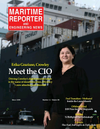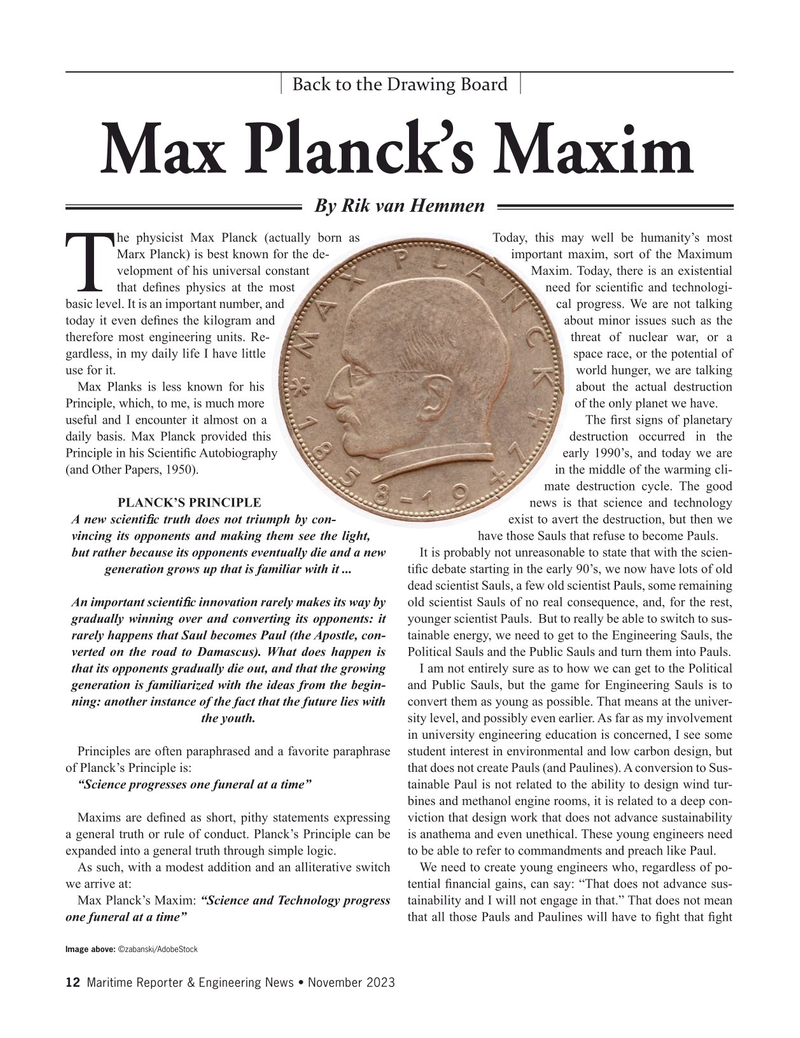
Page 12: of Maritime Reporter Magazine (November 2023)
Workboat Edition
Read this page in Pdf, Flash or Html5 edition of November 2023 Maritime Reporter Magazine
Back to the Drawing Board
Max Planck’s Maxim
By Rik van Hemmen he physicist Max Planck (actually born as Today, this may well be humanity’s most
Marx Planck) is best known for the de- important maxim, sort of the Maximum velopment of his universal constant Maxim. Today, there is an existential
Tthat de? nes physics at the most need for scienti? c and technologi- basic level. It is an important number, and cal progress. We are not talking today it even de? nes the kilogram and about minor issues such as the therefore most engineering units. Re- threat of nuclear war, or a gardless, in my daily life I have little space race, or the potential of use for it. world hunger, we are talking
Max Planks is less known for his about the actual destruction
Principle, which, to me, is much more of the only planet we have.
useful and I encounter it almost on a The ? rst signs of planetary daily basis. Max Planck provided this destruction occurred in the
Principle in his Scienti? c Autobiography early 1990’s, and today we are (and Other Papers, 1950). in the middle of the warming cli- mate destruction cycle. The good
PLANCK’S PRINCIPLE news is that science and technology
A new scienti? c truth does not triumph by con- exist to avert the destruction, but then we vincing its opponents and making them see the light, have those Sauls that refuse to become Pauls.
but rather because its opponents eventually die and a new It is probably not unreasonable to state that with the scien- generation grows up that is familiar with it ... ti? c debate starting in the early 90’s, we now have lots of old dead scientist Sauls, a few old scientist Pauls, some remaining
An important scienti? c innovation rarely makes its way by old scientist Sauls of no real consequence, and, for the rest, gradually winning over and converting its opponents: it younger scientist Pauls. But to really be able to switch to sus- rarely happens that Saul becomes Paul (the Apostle, con- tainable energy, we need to get to the Engineering Sauls, the verted on the road to Damascus). What does happen is Political Sauls and the Public Sauls and turn them into Pauls.
that its opponents gradually die out, and that the growing I am not entirely sure as to how we can get to the Political generation is familiarized with the ideas from the begin- and Public Sauls, but the game for Engineering Sauls is to ning: another instance of the fact that the future lies with convert them as young as possible. That means at the univer- the youth. sity level, and possibly even earlier. As far as my involvement in university engineering education is concerned, I see some
Principles are often paraphrased and a favorite paraphrase student interest in environmental and low carbon design, but of Planck’s Principle is: that does not create Pauls (and Paulines). A conversion to Sus- “Science progresses one funeral at a time” tainable Paul is not related to the ability to design wind tur- bines and methanol engine rooms, it is related to a deep con-
Maxims are de? ned as short, pithy statements expressing viction that design work that does not advance sustainability a general truth or rule of conduct. Planck’s Principle can be is anathema and even unethical. These young engineers need expanded into a general truth through simple logic. to be able to refer to commandments and preach like Paul.
As such, with a modest addition and an alliterative switch We need to create young engineers who, regardless of po- we arrive at: tential ? nancial gains, can say: “That does not advance sus-
Max Planck’s Maxim: “Science and Technology progress tainability and I will not engage in that.” That does not mean one funeral at a time” that all those Pauls and Paulines will have to ? ght that ? ght
Image above: ©zabanski/AdobeStock 12 Maritime Reporter & Engineering News • November 2023
MR #11 (1-17).indd 12 11/2/2023 9:00:03 AM

 11
11

 13
13
